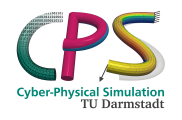Simulation of additive manufacturing with digital twins and machine learning
Simulation von 3D Druckprozessen mit Digitalen Zwillingen und Machine Learning
Masterthesis
Additively manufactured structures have a wide range of applications, e.g. in mechanical engineering or biomedicine. Depending on the field of application, such metamaterials can be produced from high-quality metallic materials, plastics or biomaterials. Especially for large or very valuable printing processes, the required structural properties must be achieved in the first printing attempt („first time right“).
The aim of this work is to develop a concept for compensating for printing defects. By simulating the printing process while it is still in progress, the desired structural properties are ensured by replanning the rest of the printing process.
In addition, the student is given the opportunity to be familiarized with state-of-the-art machine learning technologies in Python in order to carry out dynamic process simulations accurately and effectively.
Proposed procedure
- Literature research
- Data generation by means of process simulations
- Implementation of dynamic machine learning models (e.g. neural ODEs)
- Conceptualization of an approach for the replanning of components
- Writing up the master's thesis
- (additional option: publication of an article after the thesis and potential employment as a research assistant)
Prerequisites
- Good programming skills in Python or plausible learning aspirations
- Experience with neural networks desirable
- Basic knowledge of 3D printing processes and simulation methods is advantageous




